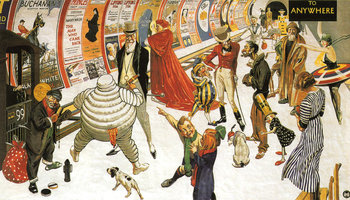|
| |
Six degrees of separation is the theory that every person and every thing on the planet can be associated by six or less connections. Currently, the most common application of the idea is the friend-of-a-friend concept of social networks whereby people are typically connected to millions of people at 2 or 3 levels of separation. Six degrees of separation was proposed by Frigyes Karinthy in 1929. The idea instantly captured the public's imagination as it makes the world seem small. With the arrival of social networks the idea has been somewhat validated. A 2009 Facebook application called "Six Degrees" put the average at 5.73 with 12 being the maximum. Social networks don't have access to all connections between people, so the 12 maximum could represent a lack of data.
|
Type | Social Media | Definition | The theory that all people and things on the planet are separated by at most six connections. | Value | Business models such as social mediaMarketing concepts such as word of mouth | Related Concepts | |
Economics
This is the complete list of articles we have written about economics.
If you enjoyed this page, please consider bookmarking Simplicable.
A list of key marketing strategies.
An overview of 20+ common branding techniques.
A list of common ways to measure marketing results.
An overview of common pricing strategies.
A definition of product positioning with examples.
Common types of brand storytelling.
The common types of cross-selling.
The common types of marketing campaign.
The common types of marketing automation.
The common types of target marketing.
A list of economic theories that are particularly useful for business.
The tendency for people at high risk to buy insurance.
A list of economic positions or capabilities that allow you to outperform in a particular industry.
A definition of knowledge work with examples.
A definition of production with examples.
An overview of post-scarcity.
The common types of economic infrastructure.
The common types of business competition.
The common types of inefficiency.
An overview of supply with common examples.
TrendingThe most popular articles on Simplicable in the past day.
Recent posts or updates on Simplicable.
Site Map
© 2010-2023 Simplicable. All Rights Reserved. Reproduction of materials found on this site, in any form, without explicit permission is prohibited.
View credits & copyrights or citation information for this page.
|































